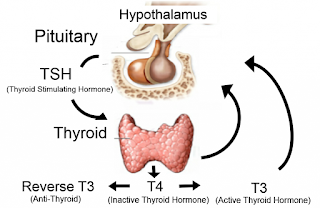Thyroid
Thyroid disorders are conditions that affect the thyroid gland, a butterfly-shaped gland in the front of the neck. The thyroid has important roles to regulate numerous metabolic processes throughout the body. Different types of thyroid disorders affect either its structure or function.
The thyroid gland is located below the Adam's apple wrapped around the trachea (windpipe). A thin area of tissue in the gland's middle, known as the isthmus, joins the two thyroid lobes on each side. The thyroid uses iodine to produce vital hormones. Thyroxine, also known as T4, is the primary hormone produced by the gland. After delivery via the bloodstream to the body's tissues, a small portion of the T4 released from the gland is converted to triiodothyronine (T3), which is the most active hormone.
The function of the thyroid gland is regulated by a feedback mechanism involving the brain. When thyroid hormone levels are low, the hypothalamus in the brain produces a hormone known as thyrotropin releasing hormone (TRH) that causes the pituitary gland (located at the base of the brain) to release thyroid stimulating hormone (TSH). TSH stimulates the thyroid gland to release more T4.
Since the thyroid gland is controlled by the pituitary gland and hypothalamus, disorders of these tissues can also affect thyroid function and cause thyroid problems.
There are specific kinds of thyroid disorders that includes:
- Hypothyroidism
- Hyperthyroidism
- Goiter
- Thyroid nodules
- Thyroid cancer
- to reach to the Ideal body weight
- correct the thyroid problem with diet along with medication
- try to control the stress levels
- strictly maintain a low fat diet as the cholesterol levels are very high
- to maintain blood glucose levels
- to follow a regular exercise / yoga and do brisk walking which will increase the good cholesterol (HDL)
- Fat loss and inch loss is recommended.
- Goitrogens should be avoided in diet.







No comments:
Post a Comment